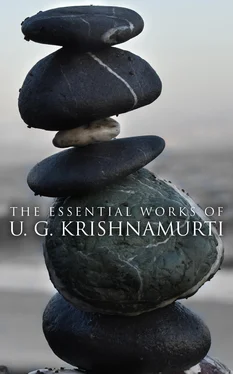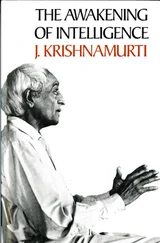U. Krishnamurti - The Essential Works of U. G. Krishnamurti
Здесь есть возможность читать онлайн «U. Krishnamurti - The Essential Works of U. G. Krishnamurti» — ознакомительный отрывок электронной книги совершенно бесплатно, а после прочтения отрывка купить полную версию. В некоторых случаях можно слушать аудио, скачать через торрент в формате fb2 и присутствует краткое содержание. Жанр: unrecognised, на английском языке. Описание произведения, (предисловие) а так же отзывы посетителей доступны на портале библиотеки ЛибКат.
- Название:The Essential Works of U. G. Krishnamurti
- Автор:
- Жанр:
- Год:неизвестен
- ISBN:нет данных
- Рейтинг книги:5 / 5. Голосов: 1
-
Избранное:Добавить в избранное
- Отзывы:
-
Ваша оценка:
- 100
- 1
- 2
- 3
- 4
- 5
The Essential Works of U. G. Krishnamurti: краткое содержание, описание и аннотация
Предлагаем к чтению аннотацию, описание, краткое содержание или предисловие (зависит от того, что написал сам автор книги «The Essential Works of U. G. Krishnamurti»). Если вы не нашли необходимую информацию о книге — напишите в комментариях, мы постараемся отыскать её.
Content:
The Mystique of Enlightenment
Courage to Stand Alone
Mind is a Myth
No Way Out
Thought is Your Enemy
The Natural State
The Essential Works of U. G. Krishnamurti — читать онлайн ознакомительный отрывок
Ниже представлен текст книги, разбитый по страницам. Система сохранения места последней прочитанной страницы, позволяет с удобством читать онлайн бесплатно книгу «The Essential Works of U. G. Krishnamurti», без необходимости каждый раз заново искать на чём Вы остановились. Поставьте закладку, и сможете в любой момент перейти на страницу, на которой закончили чтение.
Интервал:
Закладка:
______________
Where does thought come from? Is it from inside, or outside? Where is the seat of human consciousness? So, for purposes of communication, or just to give a feel about it, I say there is a 'thought sphere'. In that 'thought sphere' we are all functioning, and each of us probably has an 'antenna', or what you call an 'aerial' or something, which is the creation of the culture into which we are born. It is that that is picking up these particular thoughts.
You have no way at all of finding out for yourself the seat of human consciousness, because it is all over, and you are not separate from that consciousness. Even with all the experiments that the brain physiologists and psychologists are doing, wasting millions and millions of dollars just to find out the seat of human consciousness, they will never be able to find it out at all. I am not making a dogmatic statement or any such thing.
Q: There is a certain capability of picking up thoughts through the 'antenna'. Now, without knowing what exactly this 'antenna' is, can we increase this capability?
UG:Why do you want to increase it? I accept the limitations as a fact, you know. I am (to use your scientific term) genetically speaking limited in my capacity. I think the capacity of the individual is very limited — I don't know — genetically determined.
Q: But even that genetic potentiality — we are using only a fraction of it.
UG:Just a fraction. For some reason or the other the culture has limited the possibility of the potential evolving into its completeness and wholeness. Somewhere along the line probably thought was necessary, but it has become the enemy of man now. It has become the enemy of man because the potential of the evolutionary process (if there is any such thing as an evolutionary process, I don't know; I can't make any definitive statement, but there seems to be something like that) is thwarted by the culture, because the culture has created a 'perfect man', a 'religious man', a 'true gentleman', a 'true blue', and so on and so on, and that is quite the opposite of what is inherent here. That inherent quality (or whatever it is you want to call it) I call 'personality'.
I use the word 'personality' in quite a different sense from the sense in which psychologists use the word. Every human being has a unique personality of his own, which is trying to express itself. The culture has created what is called a 'normal man'. You see, character building is in the interests of the continuity of the society. The character-building mechanism has suppressed and thwarted what is there inside. It is in this sense that I use the word 'personality'. There is nobody like you anywhere in this world among the four billion people we have. Physiologically speaking, the individual is an extraordinary piece of creation by the evolutionary process, so I say that every individual is unique.
Whatever is there is trying to express itself and blossom into a human being. The human being has lost all of the animal instincts, and he has not developed the human instincts. What these people talk of — psychic powers, clairvoyance, clairaudience — they are all human instincts. And they are necessary because there are two things that the human organism is interested in. One: its survival at any cost. Why should it survive? I don't know; it is a foolish question to ask. That is one of the most important things: it has a survival mechanism of its own, which is quite different from the survival mechanism of the movement of thought. The second thing is: to reproduce itself. It has to reproduce. These are the two fundamental characteristics of the human organism, the living organism.
The culture has made it impossible for the personality to express itself in its own way, because the culture has different ideas. It has created a neurotic state. It has created this divisive movement of thought. This divisive movement has got to come to an end if whatever is there is to express itself and come into flower. That possibility is part of the human mechanism: it is built-in there. So, this divisive movement, this neurotic condition of man, has got to come to an end. But is there anything that we can do?
Q: How to go about it?
UG: The problem is that anything you do — any movement in any direction, on any level — gives continuity to the structure of thought. The separation between mind and body must come to an end. Actually there is no separation. I have no objection to the word "mind," but it is not in one particular location or area; every cell in your system has a mind of its own, and its functioning or working is quite different from that of the other cells.
So, the whole chemistry of the body has to change: it has to undergo a sort of alchemy, if I may put it that way. Luckily, fortunately, there are certain areas in the human organism which are outside the control of thought. (This is what I have discovered for myself, you see. You can accept it, reject it, or do whatever you like.) They are the glands, what you call the 'ductless glands'.
Q: Fortunately?
UG:Fortunately and luckily, otherwise man is finished. The day you control them, that's the end of man: he will lose everything, he will become — he is already — just a nut and bolt in the social structure. What little freedom he can have, what little opportunity there is for this personality to express itself, will be lost.
These glands are outside the control of thought. The Hindus call them chakras. The glands are located in the exact same spots where they speculated the chakras
are. They are not in the psychic body — there is no such thing as a psychic body or causal body — they speculated, you see. They must have experienced what we call the 'ductless glands'. A tremendous amount of money is being spent, and a lot of research is going on, to find out why they are there, what the function of those glands is — the pituitary gland, the pineal gland, the thymus gland and so forth. I don't want to use the word " chakras "; I would call them "ductless glands." Unless they are activated, any chance of human beings flowering into themselves is lost. I can't say there is any such thing as an evolutionary process, but there seems to be such an evolutionary process. What its nature is, what its purpose is, I do not know; but it seems to be trying to create something. Man remains incomplete, unless the whole of this human organism blooms into something, like a flower. I don't want to use the word `flower', because it has mystical overtones.
Q: Actualization?
UG:Actualization — what prevents that is the culture. The whole thing must go out of your system. Not out there — I am not suggesting book burning or tearing down the temples.
Q: Have we the inherent power to break out of that culture?
UG:That is you, you see. Society is there inside, not outside. That culture is part of this human consciousness, so everything that man has experienced and felt before you is part of that consciousness.
But one question for which we don't have an adequate answer is "How is this transmitted from one generation to another generation?" It is really a mystery. All the experiences — not necessarily just your experiences during your span of thirty, forty or fifty years, but the animal consciousness, the plant consciousness, the bird consciousness — all that is part of this consciousness. (Not that there is an entity which reincarnates; there is no entity there, so the whole business of reincarnation is absurd as far as I am concerned.) That is why in your dreams you dream as if you are flying like a bird. You see, the sex fantasies man has, the animal postures, the Kama Sutra of Vatsyayana — all that is part of that consciousness which is transmitted from generation to generation. How it is transmitted, I don't know, I can't say, I'm not competent to say. But this seems to be the means. There must be some means of trans....
Читать дальшеИнтервал:
Закладка:
Похожие книги на «The Essential Works of U. G. Krishnamurti»
Представляем Вашему вниманию похожие книги на «The Essential Works of U. G. Krishnamurti» списком для выбора. Мы отобрали схожую по названию и смыслу литературу в надежде предоставить читателям больше вариантов отыскать новые, интересные, ещё непрочитанные произведения.
Обсуждение, отзывы о книге «The Essential Works of U. G. Krishnamurti» и просто собственные мнения читателей. Оставьте ваши комментарии, напишите, что Вы думаете о произведении, его смысле или главных героях. Укажите что конкретно понравилось, а что нет, и почему Вы так считаете.












